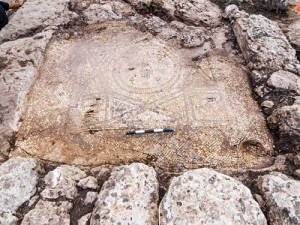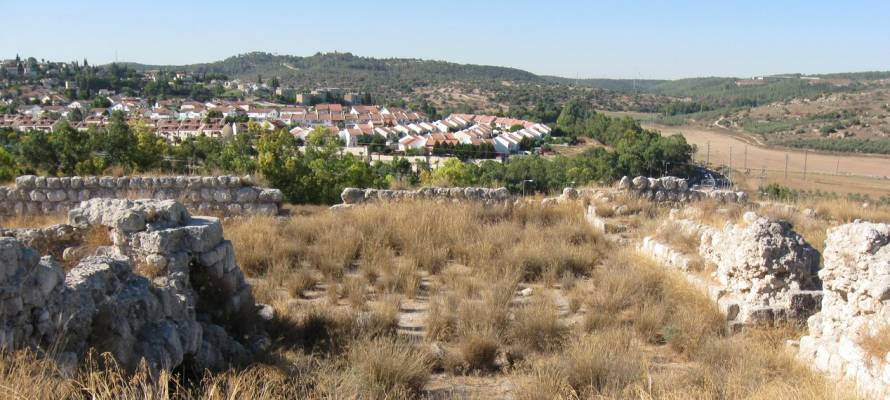The modern city of Beit Shemesh was founded in 1950. It was named for the ancient city, located just across the road from the modern metropolis.

When we moved to Israel we needed to decide where to live. My wife and I left the kids behind with the grandparents and came on a pilot trip about six months before moving day. We traveled the country north to south, looking for a suitable landing spot that would be comfortable and appropriate for our family. We considered the schools, number of English speakers, availability of affordable housing, proximity to Jerusalem, public transportation and many other factors. One thing that my wife and I agreed upon wholeheartedly was that climate would play a large role in our decision. We were moving to Israel from Miami, where there are only two seasons – hot and hotter! We wanted seasons with cold weather and snow. So we crossed off Beit Shemesh as an option. Beit Shemesh means the House of Sun. Despite all the amazing things about the city of Bet Shemesh, the weather eliminated it from our list.
The modern city of Beit Shemesh, situated approximately 30 kilometers/19 miles west of Jerusalem in the Judean hills, was founded in 1950, not long after the State of Israel was established. It was named for the ancient city of Beit Shemesh, located just across the road from the modern metropolis.
Tel Beit Shemesh is located on the side of Road 38 between the northern and southern entrances to the modern city. It is not highly visible, nor is it frequently visited, which is a shame. A tel is a hill or mound that was created over many centuries of occupation. As each city was abandoned, a new one replaced it on the exact same location. If you slice a tel as you would a seven-layer cake, you will find evidence of the various eras and peoples that occupied that spot. Archaeologists have discovered many layers of civilizations here, and hence the name Tel Beit Shemesh. It was an important city during the Canaanite and Israelite periods. It was an important border city standing at the crossroads of Canaanite, Israelite and Philistine civilizations.
Beit Shemesh was a large Canaanite city whose inhabitants worshiped the sun. It was in the 11th or 10th century BCE that the Israelites captured the town from the Canaanites and transformed it into a Jewish city. The town is mentioned numerous times in the Bible. The most famous biblical incident that occurred in Beit Shemesh was the return of the Holy Ark.

A mosaic from the Byzantine era discovered during excavations in the neighborhood of Ramat Beit Shemesh. (Assaf Peretz, Israel Antiquities Authority)
When the Israelites entered the Land of Israel, they brought with them the Tabernacle, which was the portable Temple that traveled with them during their 40 years in the desert. Eventually, a permanent Holy Temple would be built, but until that day a temporary religious capital was established in Shiloh, where the Tabernacle would rest for 369 years. During this period, the Israelites went to war with the Philistines numerous times. During one of these wars, the sons of the High Priest Eli came rushing from the battlefield to Shiloh in order to take the Holy Ark out to assist them in their battle. The Israelites were not worthy and the ark did not protect them. It was captured by the Philistines.
Ultimately the Philistines would return the ark, and it was done by way of Beit Shemesh. The ark was placed on a cow-driven cart. “Then the cows went straight up toward Beit Shemesh, keeping on the road and lowing all the way; they did not turn to the right or to the left… Now the people of Beit Shemesh were harvesting their wheat in the valley, and when they looked up and saw the ark, they rejoiced at the sight. The cart came to the field of Joshua of Beth Shemesh, and there it stopped beside a large rock.” (1 Samuel 6 -14)
In the time of King Solomon, Beit Shemesh was a very wealthy city. It was chosen as one of the cities to provide King Solomon and his large family with food for one month out of the year.
From Tel Beit Shemesh you can see Zorah and Eshtaol. According to the Bible, Samson was born between these cities. The valley below Beit Shemesh, the Sorek Valley, is where the story of Samson and Delilah unfolded.
When visiting Beit Shemesh, one can see the underground water reservoir that was used to provide for the city. Make sure, though, that you bring a flashlight because there are no lights or safety rails. After the winter rains, it could also be filled with water.
Israel is literally saturated with sites related to the biblical stories. A visit to Tel Beit Shemesh allows some of these stories to come to life and connects the ancient city with the modern one. When standing on the tel, your feet are rooted in the past, while at the same time your eyes behold the future, the modern city of Beit Shemesh.
By: Moshe Rothchild, licensed tour guide

Free Ebook: 10 Best Places to Visit in Israel
The Land of Israel has provided the backdrop for some of the most important events in human history. From the Old City in Jerusalem to the Sea of Galilee, people from all over the globe visit the Holy Land each year to take in the breathtaking scenery and inspiration of Israel. Now you can experience this beauty for yourself from the comforts of home and maybe plan a trip of your own to Israel. Get the free, exclusive eBook from United with Israel: The 10 Best Places to Visit in Israel.
